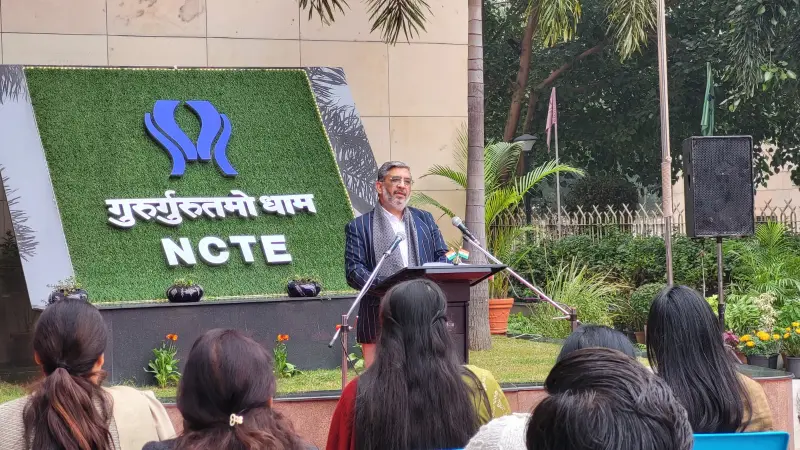If you’re planning to pursue a degree, you might have heard about NCTE recognition. But why is it so important for teacher training programs?
The National Council for Teacher Education (NCTE) is a regulatory body that ensures quality standards in teacher education. Without its approval, teaching degrees may not be legally valid.
Jammu University is a well-known institution with a strong academic reputation. But does it have NCTE accreditation for its teaching programs?
Let’s explore why NCTE recognition matters and what it means for students at Jammu University.
Is Jammu University Recognised by NCTE?

Yes, the University of Jammu's Postgraduate Department of Education is recognized by the National Council for Teacher Education (NCTE) for its programs.
You can refer to this document for more information:
The NCTE grants recognition to specific teacher education programs rather than entire universities.
This development follows the extension of NCTE’s regulatory oversight to Jammu and Kashmir after October 2019, necessitating that teacher education programs in the region obtain NCTE recognition.
It’s important to note that NCTE recognition is program-specific, meaning individual courses such as B.Ed., M.Ed., B.P.Ed., and M.P.Ed. require separate accreditation.
While universities may offer multiple teacher education programs, each must independently meet NCTE’s standards and obtain recognition.
For instance, the Central University of Jammu‘s Department of Educational Studies also secured NCTE recognition for its M.Ed. program in January 2025.
To verify the recognition status of specific programs, stakeholders are encouraged to consult the official NCTE portal, which maintains an updated list of accredited institutions and their approved courses.
Jammu University’s NCTE-Approved Courses & Affiliated Colleges
The University of Jammu offers several teacher education programs recognized by the National Council for Teacher Education (NCTE).
These programs are designed to prepare competent educators equipped with the necessary skills and knowledge.
NCTE-Recognized Programs at Jammu University
- Bachelor of Education (B.Ed.): A foundational program aimed at training graduates to become proficient school teachers.
- Master of Education (M.Ed.): An advanced course focusing on educational research, pedagogy, and leadership roles in the education sector.
Affiliated Colleges Offering NCTE-Approved Courses
Jammu University affiliates with numerous colleges across various districts, offering NCTE-approved teacher education programs. Below is a district-wise breakdown:
Jammu District
- Adarsh College of Education: Offers B.Ed. program.
- Bhargava College of Education: Provides B.Ed. course.
- Divya College of Education: Conducts B.Ed. program.
- Guru Nanak College of Education: Offers B.Ed. course.
- KC College of Education: Provides B.Ed. program.
- Luthra College of Education: Offers B.Ed. course.
- New Gandhi Memorial College of Education: Conducts B.Ed. program.
- Shri Vaishno Devi College of Education: Offers B.Ed. course.
- Tagore College of Education: Provides B.Ed. program.
- The New Millennium National College of Education: Offers B.Ed. course.
- Trikuta College of Education: Conducts B.Ed. program.
- Vimal Muni College of Education: Offers B.Ed. course.
Kathua District
- Ashoka College of Education: Provides B.Ed. program.
- Baba Farid College of Education: Offers B.Ed. course.
- Bhagat Kabir College of Education: Conducts Graduate Diploma in Education.
- Bharat College of Education: Offers B.Ed. program.
- Rajiv Gandhi Memorial College of Education: Provides B.Ed. course.
- Shri Guru Gangdev College of Education: Offers B.Ed. program.
Udhampur District
- AlNoor College of Education: Offers B.Ed. program.
- Kalra College of Education: Provides B.Ed. course.
Baramulla District
- Kashmir Paradise College of Education: Offers B.Ed. program.
Rajouri District
- Himalayan College of Education: Provides B.Ed. course.
Anantnag District
- Rehmat-e-Aalam Institute of Education: Offers B.Ed. program.
Pulwama District
- Soch Kral Memorial College of Education: Provides B.Ed. course.
- Zakir Memorial College of Education: Offers B.Ed. program.
Key Compliance Factors for NCTE Recognition
To obtain and maintain NCTE recognition, institutions must adhere to specific standards, including:
- Faculty Qualifications: Employing adequately qualified and experienced teaching staff.
- Infrastructure: Maintaining necessary facilities such as well-equipped classrooms, libraries, and laboratories.
- Curriculum Standards: Implementing a curriculum that aligns with NCTE guidelines and promotes comprehensive teacher education.
Again, for a comprehensive and updated list of NCTE-recognized institutions and their approved courses, stakeholders are encouraged to consult the official NCTE portal.
How to Verify Jammu University’s NCTE Recognition Status?
To confirm whether Jammu University or its affiliated colleges have NCTE recognition, follow these steps:
Step 1: Visit the Official NCTE Website.
- Go to the official National Council for Teacher Education (NCTE) portal: NCTE Recognized Institutions List.
Step 2: Search for “Jammu University” or Its Affiliated Colleges.
- Use the search bar to enter “Jammu University” or the exact name of the affiliated college. Ensure you select the correct state/UT (Jammu & Kashmir) for accurate results.
Step 3: Check Official Documentation (NCTE Gazette Notifications).
- Look for recognition orders, approval letters, or gazette notifications related to the university’s teacher education programs.
These documents confirm whether specific courses like B.Ed. or M.Ed. have valid accreditation.
Step 4: Contact NCTE or Jammu University for Official Confirmation.
If the program does not appear in the NCTE list or needs further verification, contact NCTE Helpdesk. [011-20893266, 20893267]
University of Jammu’s Department of Education: Visit www.jammuuniversity.ac.in or call their admin office for verification.
Following these steps ensures that students, faculty, and institutions can independently verify the latest recognition status without relying on third-party sources.
Difference Between UGC & NCTE Recognition (Avoiding Common Confusion)
Understanding the distinction between UGC and NCTE is crucial for students choosing educational institutions, especially for teacher training programs.
What Does UGC Approve?
The University Grants Commission (UGC) is responsible for:
- Approving and regulating universities and colleges in India.
- Ensuring institutions meet academic, financial, and administrative standards.
- Granting universities the authority to award degrees (e.g., BA, BSc, MA, MSc).
- Overseeing research, faculty development, and funding for higher education institutions.
Example: If a university is UGC-approved, it means it is legally authorized to offer degree programs but does not necessarily mean it is accredited for professional teacher education.
What Does NCTE Regulate?
The National Council for Teacher Education (NCTE) specifically oversees teacher training programs in India, ensuring quality in education programs like:
- B.Ed. (Bachelor of Education)
- M.Ed. (Master of Education)
- B.P.Ed. (Bachelor of Physical Education)
- D.El.Ed. (Diploma in Elementary Education)
Key Role: NCTE ensures these programs meet pedagogical, infrastructural, and faculty requirements, making graduates eligible for teaching positions in schools and colleges.
Why Some Universities Are UGC-Approved but Lack NCTE Recognition?
Many universities have UGC approval but do not offer NCTE-accredited teacher education courses due to:
- Non-compliance with NCTE-specific faculty or infrastructure standards.
- Lack of teacher training programs in their curriculum.
- Universities offering teacher education without separate NCTE accreditation.
Example: A university may be UGC-approved for general degrees but still need NCTE approval to legally offer B.Ed. or M.Ed. programs.
Impact of Studying in a Non-NCTE Recognized Institution
Degree Validity Issues:
A B.Ed. or M.Ed. from a non-NCTE recognized institution is not valid for government teaching jobs.
- Students may face rejection in teacher eligibility tests (TET, CTET, STET).
- Schools and colleges may refuse to hire non-NCTE-certified graduates.
Solution: Always verify the institution’s NCTE recognition before enrolling in any teacher education program via the NCTE portal.
By distinguishing UGC and NCTE roles, students can make informed decisions, avoiding institutions that lack proper accreditation for teacher education.
Implications of Studying in a Non-NCTE Recognized Institution
Enrolling in a non-NCTE recognized teacher education program can have serious consequences. Here’s what you need to know:
- Non-NCTE Degrees Lack Validity – A B.Ed. or M.Ed. from an unrecognized institution may not be legally accepted. This can lead to disqualification from teaching jobs.
- No Government Teaching Eligibility – NCTE recognition is mandatory for appearing in CTET, STET, and state-level teacher recruitments. Without it, job applications get rejected.
- Blocked Career Progression – Promotions in government schools require valid credentials. Even private institutions often prefer NCTE-approved degrees for compliance.
- Issues in Further Studies – Many universities reject applications for M.Ed. and Ph.D. if the B.Ed. degree isn’t NCTE-approved. This limits academic growth.
- Legal Risks & Fake Accreditations – Several cases, like Mukta Ram Deka v. State of Assam, proved degrees from unapproved colleges invalid. Students lost jobs.
To secure your future, always verify an institution’s NCTE recognition before enrolling. A recognized degree ensures eligibility, career stability, and legal validity.
Anything Left?
NCTE recognition is essential for ensuring the quality and legitimacy of teacher education programs. It safeguards career prospects, making graduates eligible for government and private teaching jobs.
Jammu University plays a key role in maintaining compliance with national standards, ensuring its affiliated colleges meet NCTE requirements for accreditation.
Final Advice: Always verify an institution’s NCTE recognition before enrolling. Stay updated by visiting the official NCTE website and Jammu University’s website for the latest accreditation status.
FAQs
Does Jammu University have NCTE accreditation for B.Ed.?
Yes, Jammu University offers B.Ed. programs through its affiliated colleges, many of which are NCTE-approved. For a detailed list, refer to the university’s official website.
How can I check if my college under Jammu University is NCTE-approved?
Visit the NCTE Recognized Institutions List and search for your college by name or location.
Can I get a government teaching job with a non-NCTE degree?
No, a degree from a non-NCTE recognized institution is typically not valid for government teaching positions, as NCTE accreditation is a mandatory requirement.
What happens if my college loses NCTE recognition after I graduate?
Generally, if your college was NCTE-recognized at the time of your graduation, your degree remains valid. However, the loss of accreditation can pose challenges for future professional licensing and employment opportunities.
